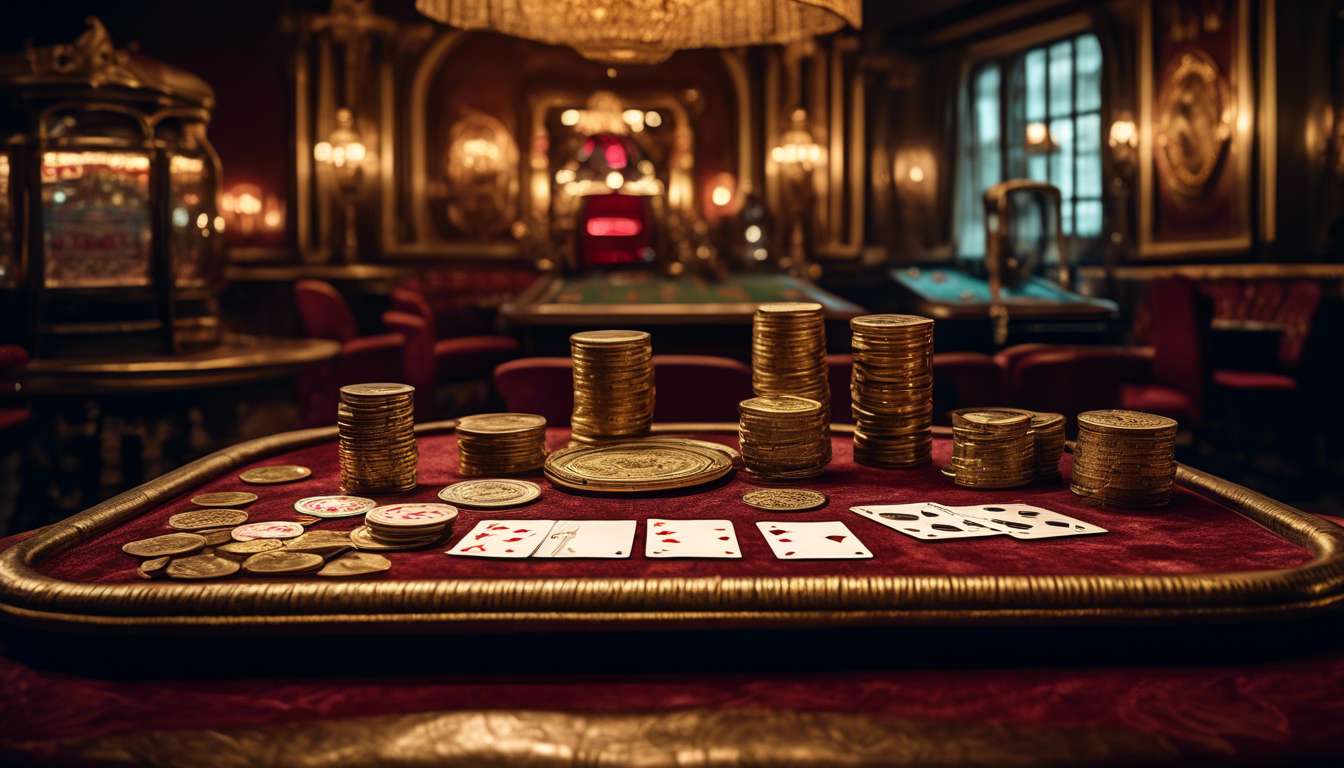As we embark on a journey through the history of gambling in Germany, we find ourselves tracing a rich and intricate tapestry woven over centuries. Our exploration delves into the cultural, social, and economic threads that have shaped gambling from its early origins to its modern evolution.
The allure of chance and fortune captivated our ancestors, influencing everything from medieval card games and early lotteries to the sophisticated casinos of today. This fascination with games of chance has been both celebrated and scrutinized, reflecting broader societal attitudes and changes.
Legal and cultural shifts over time have significantly impacted the development of gambling. By examining historical events and regulations, we discover how these factors have molded gambling into its current form.
Understanding this history provides insight into not only the past but also the ongoing dialogue about gambling’s place in our society today.
Join us as we unravel this captivating narrative, exploring the milestones and transformations that have defined the gambling landscape in Germany.
Early Origins of Gambling
Archaeological discoveries show that gambling in Germany dates back to ancient times, with evidence of dice games from Roman settlements. These early origins reveal a shared history that connects us to our ancestors, who also sought the thrill of chance. It’s fascinating to think about how these ancient Romans, much like us today, might have gathered around tables to test their luck and skill.
Fast forward to the Middle Ages, and we see the emergence of lotteries across German territories. These lotteries were not just games; they were community events that brought people together, creating a sense of belonging and shared excitement. It’s clear that gambling has long been more than just a pastime—it’s been a part of our social fabric.
Regulations, even in early times, were put in place to control the spread of gambling activities. These rules helped ensure that gaming remained a fair and enjoyable activity for everyone involved, fostering a community bound by shared interests and fair play.
Influence of Medieval Games
During the medieval period, various games of chance and skill profoundly shaped cultural practices and social interactions in Germany. These activities were more than mere entertainment; they were a crucial part of the social fabric.
Gambling was a popular pastime that brought communities together in shared anticipation and hope. By engaging in these games, people found kinship and camaraderie, as well as an opportunity to test their luck and skill.
- Types of games included:
- Dice games
- Early forms of card games
Lotteries began appearing, offering tantalizing prospects for wealth and changing the dynamics of medieval society. With these developments, regulations started to emerge, attempting to balance the thrill of gambling with the need for order and fairness. These rules aimed to:
- Protect participants
- Maintain harmony within communities
As we look back, it’s clear that medieval games not only provided enjoyment but also laid the groundwork for the structured gambling practices we know today.
The Rise of Lotteries
Throughout the centuries, lotteries have gradually gained prominence, transforming from simple draws into sophisticated systems that captivate the public’s imagination. It began with an undeniable allure—a chance to win big, to change one’s fate with the draw of a number.
Together, we watched as lotteries evolved, becoming a staple in our communities and a shared experience that brought us closer.
As gambling grew, so too did the need for regulations. We understood that to maintain fairness and trust, implementing rules was essential. Governments stepped in, crafting regulations that ensured lotteries were conducted transparently and responsibly.
This not only protected participants but also legitimized the activity, allowing it to flourish within our society.
Lotteries have become more than just a form of gambling; they’re a part of our cultural fabric, a communal event that binds us through shared hopes and dreams.
As we continue to participate, we carry forward this rich tradition, confident in the regulations that safeguard our collective enjoyment.
Evolution of Casino Culture
In the vibrant tapestry of Germany’s gambling history, casinos have emerged as a dynamic force, shaping entertainment and social interactions. We’ve witnessed their evolution from humble beginnings to sophisticated establishments that captivate both locals and tourists alike.
While lotteries introduced many to the thrill of chance, casinos have offered an immersive experience, allowing us to indulge in the elegance and excitement of gambling.
Casinos in Germany are more than just venues for placing bets; they are spaces where community spirit thrives. As we’ve embraced this culture, regulations have played a crucial role in ensuring fair play and maintaining integrity.
These rules have not only protected us but have also fostered an environment where we feel safe and connected.
Our shared passion for this form of entertainment has driven the casino culture forward, blending tradition and modernity. As we navigate this fascinating world, we find ourselves part of a vibrant community, bound by the shared thrill of gambling.
Impact of Historical Regulations
Throughout history, Germany’s gambling laws have profoundly shaped the landscape of the casino industry. As a community, we’ve navigated an intricate web of regulations that have evolved over centuries. These strict rules have often reflected the cultural and political climate of their times, ensuring that participation in gambling activities remains both safe and regulated.
In the early days, gambling was tightly controlled, with lotteries often being the only form of legal gambling. These regulations ensured that:
- Profits were directed towards public goods.
- A sense of shared benefit was fostered within society.
As regulatory frameworks expanded, they paved the way for modern casinos. This expansion maintained a balance between:
- Freedom
- Responsibility
Today, historical regulations still impact our gambling activities. They shape the way we:
- Engage in lotteries
- Step into a casino
As members of this vibrant community, understanding our past helps us appreciate the careful crafting of our present gaming landscape.
Societal Attitudes Towards Gambling
Over the years, societal attitudes towards gambling in Germany have shifted significantly, reflecting broader cultural and economic trends. Gambling and lotteries have woven themselves into our social fabric, offering both excitement and a chance at prosperity. However, our collective views have been shaped by evolving regulations aimed at balancing entertainment with responsibility.
In times past, gambling was often viewed with skepticism, especially when regulations were lax. As society has grown more accepting, regulations have become more robust, promoting fairness and protecting vulnerable individuals. We’ve embraced lotteries as a socially acceptable form of gambling, often participating in them as a shared community experience.
As we navigate these attitudes, we find ourselves in a dual space where gambling is both a popular pastime and a subject of careful regulation. Our cultural identity is linked to how we perceive and manage gambling, ensuring it aligns with our values and community ethics.
In this journey, we’re continually redefining our stance, striving to make sure that our approach to gambling reflects our evolving values and collective ethics.
Modern Gambling Landscape in Germany
Today, we see a dynamic gambling landscape in Germany, marked by technological innovations and a diverse array of gaming options.
As we embrace our shared passion for entertainment, online casinos and sports betting platforms have become increasingly popular. These platforms offer us the thrill of gambling from the comfort of our homes, bringing us together in a digital community that transcends traditional boundaries.
Lotteries continue to hold a special place in our hearts, offering us not only a chance to win big but also a sense of unity as we collectively dream of striking it rich.
Our regulations ensure that gambling remains a safe and fair experience for all of us, maintaining the integrity of the industry while protecting our wellbeing.
By constantly adapting to new technologies and trends, Germany’s gambling scene provides us with endless opportunities to engage and connect. We remain committed to fostering a responsible and enjoyable environment that celebrates our love for gaming.
Ongoing Debate on Gambling Ethics
As we delve into the ongoing debate on gambling ethics, many of us find ourselves questioning the moral implications and social responsibilities tied to our gaming practices. Gambling, with its allure of quick fortune, draws us in, but it also compels us to consider how regulations can protect both participants and society at large. The ethical concerns aren’t just about those who gamble but also about the responsibilities we share as a community.
Lotteries, often seen as a benign form of gambling, also bring ethical questions. Are we contributing to societal good through state-sponsored lotteries, or are we encouraging a potentially harmful habit? Regulations aim to strike a balance, ensuring fairness while preventing exploitation. Yet, the question remains: Are these measures enough to address the deeper moral issues?
Together, we must navigate this complex landscape, recognizing our shared values and responsibilities. By engaging in open discussions, we can foster a more ethical approach to gambling that aligns with our collective sense of belonging.
- Key Considerations:
- Moral implications of gambling
- Social responsibilities and community impact
- Effectiveness of regulations in ensuring fairness and preventing exploitation
By addressing these considerations, we can work towards a more responsible and ethical gambling environment.
What are the most popular gambling games in Germany today?
In Germany, a variety of gambling games are enjoyed, both in casinos and on online platforms.
The most popular games include:
-
Slot Machines: These are particularly loved for their simplicity and excitement.
-
Poker: This game requires skill and strategy, making it a favorite for those who enjoy a challenge.
-
Blackjack: Similar to poker, blackjack also necessitates strategic thinking.
-
Roulette: Known for its suspenseful nature and potential for big wins, roulette remains a classic choice among gamblers.
Each of these games offers a unique experience, catering to different preferences and levels of engagement.
How does Germany’s gambling industry compare to other European countries?
When comparing Germany’s gambling industry to other European countries, we notice its unique blend of traditional games and modern innovations.
Our industry thrives on a diverse range of offerings:
- Classic casino games
- Cutting-edge online platforms
Germany’s regulations strike a balance between consumer protection and industry growth, setting us apart from our European counterparts.
Overall, our gambling landscape stands out for:
- Its rich history
- Strong regulations
- Dynamic evolution
Are there any famous gambling personalities or figures in German history?
Notable Gambling Personalities in German History
In German history, several notable gambling personalities have made significant contributions to the industry. Their innovations and influence have left a lasting impact, shaping the gambling landscape in unique ways.
Key Figures and Their Contributions
-
Strategies and Successes:
- These individuals have developed innovative strategies that have revolutionized gambling practices.
- Their successes in various gambling arenas have set benchmarks for future enthusiasts and professionals.
-
Controversies:
- Some personalities have been involved in controversies that brought attention to the ethical and legal aspects of gambling.
- These controversies often sparked debates and led to reforms in gambling regulations.
Impact on the Gambling Landscape
- The stories of these figures are intriguing and provide insights into the evolution of gambling in Germany.
- Understanding their journeys highlights the cultural and economic impact they have had on the industry.
Exploring the lives and legacies of these personalities is not only fascinating but also essential for comprehending the broader history and dynamics of gambling in Germany.
Conclusion
In conclusion, the history of gambling in Germany reveals a rich tapestry of early origins, medieval influences, and evolving societal attitudes.
From the rise of lotteries to the development of casino culture, the landscape of gambling in Germany has been shaped by:
- Historical regulations
- Ongoing debates on ethics
Today, the modern gambling scene reflects a complex interplay of tradition and innovation, highlighting the enduring fascination with games of chance in German society.

